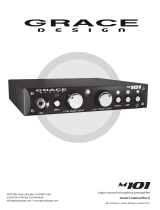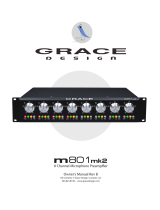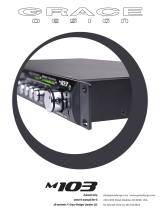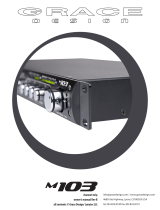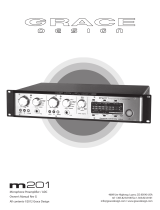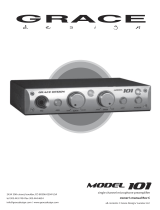Page is loading ...

single channel microphone preamplier
m
101
all contents © Grace Design/ Lunatec LLC
owner’s manual Rev A
4689 Ute Highway, Lyons, CO 80540 USA
tel 1.303.823.8100 fax 1.303.823.8101
info@gracedesign.com / www.gracedesign.com

m
101
page 2
Welcome and thanks for purchasing the Grace Design m101 microphone preamplier and instrument DI. We
design and build our products to be completely reliable and easy to use, so you can concentrate on making
great recordings, not struggling with complicated equipment or dicult product manuals. While you will nd
the m101 is completely straightforward to use, we do ask that you spend a little time familiarizing yourself with
this product manual to help avoid any common user diculties.
In the event that you do encounter any technical diculties with this or any of our products, feel free to call us at
303-823-8100. Our oce hours are 9 to 5, Monday through Friday, MST, or you may email any technical ques-
tions to: info@gracedesign.com.
Also, please check out our web site (www.gracedesign.com) for the latest Grace Design product information,
owners manuals and technical documents.
Grace Design has been building audiophile-quality products for the recording industry over 15 years. The
technology in the m101 is the result of extensive listening, eld-testing and careful renement. Your new m101
preamplier represents a combination of absolutely pristine audio performance, robust mechanical construction
and bombproof reliability at a reasonable price. Regardless of what audio sources you plan to record, your m101
will faithfully serve as an invisible link between your microphone or instrument and recording device.
We sincerely hope our products help you achieve a new level of excellence in your work!
The Grace Design Team
CONTENTS
IMPORTANT SAFETY INFORMATION 3
GENERAL 3
SAFETY MARKING SYMBOLS 3
SERVICE INFORMATION 3
FEATURES 4
FRONT PANEL FEATURES 4
m101 CONNECTIONS 5
OPERATING THE m101 6
BASIC OPERATION 6
USING ThE TRIM CONTROL 7
USING RIBBON MIC MOdE 7
USING ThE hPF 7
RACKMOUNTING ThE m101 7
CABLE DIAGRAMS 8
BASIC WIRING DIAGRAM 8
SPECIFICATIONS 9
WARRANTY INFORMATION 10
MANUAL REVISIONS 11

m
101
page 3
IMPORTANT SAFETY INFORMATION
GENERAL
•Indoor use only
•Ordinary Protection: This equipment should not be exposed to dripping or splashing.
•Avoid placing objects lled with liquids, such as vases or glasses, on this equipment.
•Class I Equipment (grounded type)
•Electrical rating: 100-240V~ 50-60Hz 5W
•Mains supply voltage uctuations are not to exceed ±10% of the nominal supply voltage.
•Pollution Degree 2
•Installation (Overvoltage) Category II for transient overvoltages.
•Maximum Relative Humidity: <80%
•Operation temperature range: 10 °C to 40 °C
•Storage and transportation temperature range –40 °C to 70 °C
•Maximum altitude: 3000m (9843 ft)
•Equipment suitable for continuous operation
•Weight: preamplier 1.09kg (2.4lbs)
SAFETY MARKING SYMBOLS
CAUTION: READ ACCOMPANYING DOCUMENTS
This symbol, located on the equipment and in this manual, refers to important instructions. Read
this manual thoroughly before operating this equipment.
WARNING: ELECTRICAL SHOCK HAZARD
This symbol, located on the equipment and in this manual, indicates the potential for electrical
shock hazard.
SERVICE INFORMATION
The Grace Design m101 contains no user serviceable components. Contact Grace Design for repair and upgrade
information. In the event that your Grace Design m101 needs to be returned to the factory, contact us for a
return authorization number.

m
101
page 4
FEATURES
• Fast, musical transimpedance amplier architecture
• Fully balanced, transformerless XLR microphone input
• High impedance 1/4 inch instrument DI input
• Output connectors: XLR balanced, TRS balanced and TS unbalanced
• 12 position precision gold contact rotary switch gain control
• 0.5% precision metal lm resistors in signal path
• High quality conductive plastic 10dB output trim control
• 75Hz 12dB/octave high pass lter
• Two color LED peak meter shows signal present and peak
• Ribbon mic mode (also great for dynamic mics)- Optimizes signal path for ribbon mics
• Aluminum 1/2 width 1U chassis / two units t together in a standard 1U rack tray
• Sealed gold contact relays for signal switching
• High precision active balanced output circuit
• No electrolytic capacitors in the signal path
• Ultra clean 48 Volt phantom power
• Minimal internal signal wiring
• Built in universal AC power supply / no wall-wart!
• 5 year warranty on parts and labor
• Made in the USA
FRONT PANEL FEATURES
1/4” TRS INSTRUMENT HIZ INPUT
For high-impedance instrument or line level inputs.
48V PHANTOM POWER
This switch provides 48 Volts to power condenser microphones. LED indicator illuminates red when active.
GAIN CONTROL
The gain control has 12 positions and adjusts the voltage gain on the microphone input from 10dB to 65dB in
5dB steps. When using the instrument input, the gain range is –10dB to 45dB in 5dB steps.
T RIM
GAIN
ribbon HPF
48V
HIZ
10dB 65dB 0dB
+
10dB

m
101
page 5
PEAK INDICATOR
The LED peak indicator, which monitors the signal at the output of the preamplier, illuminates green at -14dBu
and red at +16dB (10dB before clipping).
TRIM CONTROL
The trim control provides zero to +10dB of continuously variable output trim.
RIBBON SWITCH
Pushing this switch activates ribbon mic mode which optimizes the signal path for non-active ribbon mics. LED
indicator illuminates white when active.
HIGH PASS FILTER
(labeled HPF) 75Hz, 12dB/Octave high pass lter.
POWER STANDBY SWITCH
The power standby switch activates the preamplier circuitry. When depressed, the green POWER LED will il-
luminate.
m101 CONNECTIONS
AC LINE INPUT
A universal input AC supply provides power to the m101 with a voltage range of 100 - 240V, 50-60Hz. A standard
three prong AC power cable is included with the m101. For safety, the power supply cord must be connected to
a grounded outlet.
UNBALANCED ¼” OUTPUT
Unbalanced TS output connector. This output is wired tip signal, sleeve ground.
All three outputs on the rear panel can be used simultaneously!
BALANCED ¼” TRS OUTPUT
Balanced TRS output connector. This output is wired with the tip positive, ring negative and sleeve ground.
It is important to note that if either of the Balanced outputs are to be used unbalanced, a modied cable is
required (see cable diagram 1 and 2 on page 8). It is not recommended to use an unbalanced ¼” plug in the
balanced TRS output jack, because the sleeve of the unbalanced plug will short the inverting output amplier
PUSH
Pb
LEAD FREE
RoHS
COMPLIENT
100-240VAC
MIC INBAL OUTUNBAL OUT BAL OUT
GRACE DESIGN BOULDER, CO USA
5W MAX

m
101
page 6
to ground. While this will not cause damage to the preamplier, it can cause unwanted distortion in the unbal-
anced signal.
BALANCED XLR OUTPUT
Balanced XLR line output connector. This output is wired pin 2 positive, pin 3 negative and pin 1 ground.
MICROPHONE INPUT
For connecting a microphone to the m101. This connector is wired pin 2 positive, pin 3 negative and pin 1
ground. 48V phantom power, if used, is supplied on pins 2 and 3.
The Disconnect Device for the m101 is the Mains plug or the Appliance Coupler on the power supply
cord. The Disconnect Device must remain accessible and operable.
INSTRUMENT AND LINE INPUT
Instrument and line level signal connections are made using the ¼” TRS jack on the front panel. This connector is
balanced with the tip positive, ring negative and sleeve ground.
T R I M
GAIN
ribbon HPF
48V
HIZ
10dB 65dB 0dB
+
10dB
Using the instrument input with an unbalanced source is simple if a mono ¼” jack is
used, since the sleeve will automatically ground the inverting input (ring) when
plugged in.
When a plug is inserted into the instrument input, a sealed gold contact relay
switches the preamplier input source from the rear panel mic input connector to
the front panel TRS jack. The input impedance of the instrument input is 1M Ohm
unbalanced and 2M Ohm balanced, which is ideal for inserting high impedance
sources such as guitars with passive pickups, as well as any instrument with a high
level output. Please note that the gain range of the preamplier when using the
instrument input is –10dB to +55dB.
OPERATING THE m101
BASIC OPERATION
Turn the gain and trim controls fully counter-clockwise and check that the +48V phantom power is o. Connect
the microphone to the preamplier and then turn on the phantom power switch on if required. When sending
a signal to a recorder that has xed input levels, simply increase the gain until the optimum recording level is
reached.
When sending a signal to a recorder with a variable input, set the record level control on the recorder to 12
o’clock or midway between minimum and maximum, then set the gain on the m101 until the optimum record-
ing level is reached.
NOTE: It is important to observe proper microphone power sequencing when using phantom powered mics. Al-
ways make sure that the +48V phantom power is turned o and discharged before connecting or disconnecting
a microphone. The red +48V LED indicates the presence of voltage at the microphone input connector. It will go
out when the +48V supply is suciently discharged.

m
101
page 7
USING THE TRIM CONTROL
The trim control can be used for ne output level adjustment as well as for level riding during recording. The
trim control can add an additional 10dB of gain for a total maximum preamplier gain of 75dB. If the trim control
is not needed for riding gain or providing extra gain boost then it should be left at zero (fully counter clockwise).
USING RIBBON MIC MODE
Pushing the ribbon switch does three things: +48V phantom power is locked-out to prevent potential damage
to ribbon microphones, the impedance of the mic input is raised from 8.1k Ohms to 20k Ohms, and the 48V DC
blocking input capacitors are bypassed with sealed gold contact relays.
The maximum gain available on the m101 is 75dB, which is achieved by setting the gain control to 60dB and the
trim to 10dB. For recording low level sources with ribbon microphones, the m101 has ample available gain, suf-
cient for even the most demanding low-level recording scenarios.
Note that if the +48V phantom power is on and then the ribbon mode is engaged there will be a momentary
delay before the m101 enters ribbon mode. This is because the m101 logic circuitry waits for the +48V at the mic
input to discharge before enabling ribbon mode. Likewise, if you are in ribbon mode and the +48V switch is on,
then phantom power will turn on immediately if the ribbon mode switch is released. In general it is best practice
to turn o the +48V phantom power before entering ribbon mode.
The ribbon mode on the m101 is also ideal for many dynamic mics.
USING THE HPF
The high pass lter, sometimes referred to as a bass roll-o, starts at 75Hz. This 12dB/octave lter is optimized
for minimum phase shift. The most common uses for this are in situations where low-end rumble from mechani-
cal sources or wind are present, to reduce excessive proximity eect, or to simply help reign in excessive bass
during recording.
RACKMOUNTING THE m101
The m101 chassis has a #10-32
threaded insert mounting hole
on the bottom towards the back.
Two m101s can be mounted side
by side in a standard 1U rack tray.
Use a #10-32 x 1/2” or a #10-32 x
3/8” machine screw. Do not use a
screw longer than 1/2”.
mounting hole
chassis underside

SHIELD
HOT
GROUND
RING IS OPEN
TIP
RING
SLEEVE
Unbalanced
1/4”
Balanced Output 1/4” TRS
1
2
3
SHIELD
HOT
GROUND
(OPEN)
Unbalanced 1/4”
Balanced Output XLR
m
101
page 8
CABLE DIAGRAMS
Use these cables only when an additional unbalanced output is needed.
1/4” TRS Balanced Output to 1/4” Unbalanced input
microphone
Instrument
Recorder / Converter / DAW / Soundcard / Interface
Mixer / PA system
T R I M
GAIN
ribbon HPF
48V
HIZ
10dB 65dB 0dB
+
10dB
PUSH
Pb
LEAD FREE
RoHS
COMPLIENT
100-240VAC
MIC INBAL OUTUNBAL OUT BAL OUT
GRACE DESIGN BOULDER, CO USA
5W MAX
Instrument Amplier
BASIC WIRING DIAGRAM
XLR Balanced Output to 1/4” Unbalanced input
The following is a basic overview of some of the more common wiring possibilities for the m501.
All applications will vary, so please feel free to contact your dealer or us directly for setup and wir-
ing information.

m
101
page 9
GAIN RANGE (5dB steps)
Mic input 10-65dB
Hi-Z input -10-45dB
Output trim control 0 to +10dB
THD+N
@ 20dB Gain +20dBu out <0.00085%
@ 40dB Gain +20dBu out <0.0010%
@ 60dB Gain +20dBu out <0.0050%
INTERMODULATION DISTORTION
@ 40dB Gain +20dBu out
SMPTE/DIN 4:1 7kHz/50Hz <0.0020
NOISE - REFERRED TO INPUT
50Ω source <-130dB
150Ω source <-128dB
600Ω source <-124 dB
CMRR
100Hz >68dB
1kHz >75dB
10kHz >65dB
PHASE DEVIATION (HPF o)
50Hz-25kHz <6°
FREQUENCY RESPONSE
Mic input @ 40dB Gain -3dB 4.5Hz-390kHz
Mic input @ 40dB Gain -0.5dB 10.5Hz-140kHz
Hi-Z input @ 20dB Gain -3dB 2.5Hz-195kHz
Hi-Z input @ 20dB Gain -0.5dB 6Hz-74kHz
IMPEDANCE
Mic input 8.1kΩ
Mic input, Ribbon mode 20kΩ
Hi-Z input (unbalanced) 1MΩ
Hi-Z input (balanced) 2MΩ
Balanced Output 300Ω
Unbalanced Output 150Ω
PEAK LED METER
Green threshold -14dBu
Red threshold +16dBu
MAXIMUM OUTPUT LEVEL
100k Ohm load, 0.1% THD +25dBu
WEIGHT and DIMENSIONS
2.4 lbs H1.7” x W8.5” x D9.0”
1.09 kg H4.3cm x W21.6cm x D22.8cm
POWER CONSUMPTION
100-240VAC 5 Watts Max
SPECIFICATIONS

m
101
page 10
WARRANTY INFORMATION
• Grace Design warrants all of our products to be free of defective parts and workmanship for a period
of ve years.
• This warranty period begins at the original date of purchase and is transferable to any person who
may subsequently purchase the product during this time.
• This warranty excludes the following conditions: normal wear and tear, misuse, customer negligence,
accidental damage, unauthorized repair or modication, cosmetic damage and damage incurred
during shipment.
• During the time of this warranty, Grace Design will repair or replace, at its option, any defective parts
or repair defective workmanship without charge, provided the customer has appropriate proof of
purchase and that the product has its original factory serial number.
• Customers within the US are responsible for all inbound freight charges to Grace Design’s facility,
while Grace Design will pay for return freight charges via ground service. Customers outside the US
must contact their distributor for warranty / product return details.
• In order for Grace Design to provide ecient and timely warranty service, it is important that you
mail the completed warranty registration card enclosed with all of our products within 10 days of
the original date of purchase. You may also register your product directly with Grace Design by
telephone (303-823-8100 Monday-Friday 9:00am to 5:00pm MST), or you can register your product
online at www.gracedesign.com.
• This warranty is in lieu of all other warranties whether written, expressed, or implied, INCLUDING
ANY WARRANTIES OF MERCHANTABILITY OR FITNESS FOR A PARTICULAR PURPOSE. In no event will
Grace Design be liable for lost prots or any other incidental, consequential or Exemplary damages,
even if Grace Design is aware of the possibility of such damages.
• In no event will Grace Design’s liability exceed the purchase price of the product. This warranty gives
the customer specic legal rights. The customer may also have other rights, which vary from state
to state. Some states do not allow limitations on implied warranties or consequential damages, so
some of the limitations of the above may not apply to a particular customer.

m
101
page 11
Revision Page Change Date Initials
A all 4/7/08 edg
MANUAL REVISIONS
/
